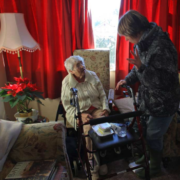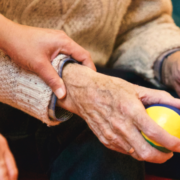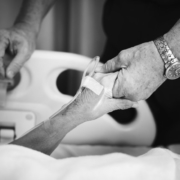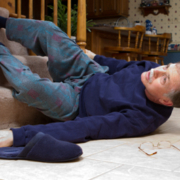
There are many factors which can lead to an elderly person becoming noncompliant with their medication, or uncooperative with their care plan. As such, there are also many different ways a caregiver can deal with either problem. So what are some things that Encompass might tell a family caregiver if they’re struggling with an uncooperative elderly parent?
First off, the answer depends on the family caregiver’s personal relationship with the elderly person before there is a crisis. For example, sudden fits of crabbiness would raise alarm to an adult daughter who has had a lifelong happy and healthy relationship with her elderly mother. Conversely, changes in behavior would be less noticeable if the relationship between the mother and daughter has a long history of turbulence. Once the type of relationship is identified, the aim should then be to figure out why the elderly parent is being uncooperative.
Common reasons for elderly noncompliance
- Side effects from medication–Side effects from medications can induce illness and older patients are especially sensitive to medication overdose complications, the New York Times notes.
- Complicated medication regimen–It’s normal for an elderly person to be taking multiple medications several times a day. Understandably, this can get complicated, especially if your parent is disabled (poor eyesight, foggy memory, etc.). Keep an up to date list of your loved one’s prescriptions and go over it with a doctor or physician if there’s a notable change in health or behavior.
- Unable or unwilling to change eating and exercise habits–For many medications to work properly, there must be a change in diet. Likewise, it’s very common for a doctor to recommend an increase in exercise to promote better health. Even so, lifelong habits are hard to change, especially when side effects from medication and physical limitation are at play.
Common reasons for an elderly parent’s uncooperative behavior
- Unhappy with their situation–The ails of old age cause many people to lose their precious independence. This is a tough situation for many people to deal with. When facing the reality of a chronic illness, or lulling on the idea of being a burden on their families, many seniors become depressed or develop a negative outlook on life. Try talking openly and honestly with your loved one about their fears. Also, consider talking to the doctor about your his or her behavior as well.
- Side effects from medication–As mentioned above, drugs can positively or negatively effect a person’s health, even leading to drastic changes in a person’s behavior.
- Cognitive decline–Alzheimer’s disease and other forms of dementia slowly take away a person’s precious memories, leading to uncharacteristic behaviors and sudden outbursts. If possible, discuss what your parents’ expectations are regarding their care. This will help you act according to their wishes should a crises arise.
Many times, when elderly parents become uncooperative/noncompliant it means, You aren’t doing what I want you to do rather than them actually not wanting change to happen. In the end, the situation comes down to negotiation and letting the parent be a true partner in the decision-making process.
Physicians Choice Private Duty currently serving Omaha, Eastern Nebraska and Western Iowa provides seniors and their families a complete understanding of geriatric care options and helps families maneuver through the challenges of the system. Get your free Cost Comparison guide by clicking here . Or contact us for a free consultation or just to say hello!
—
Photo credit: Timothy K Hamilton via photopin cc
“Physicians Choice Private Duty solves the challenges families face in caring for aging parents, with a focus on strategies that keep them in their homes. To learn more about our solutions, visit us today..”
Senior Care: How to detect elder abuse
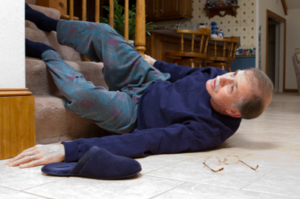
Statistics show that, with an increasing population of elderly as a result of the Baby Boom generation, elder abuse is more prevalent than ever. One study recognized that for every case of elder abuse reported to agencies nearly 25 go unreported.
While you may suspect that a relative is abusing your elderly love one is some way, it’s also important to watch out for elder abuse that comes from care facilities.
Elder abuse can come in several forms: physical, emotional and financial and neglect.
Signs of physical abuse
- Bruises, black eyes
- Marks on body like welts, cuts and open wounds
- Sprains, dislocations (like a shoulder) or broken bones
- Injuries that are healing but were never treated
- Rope marks or burns on hands and feet (could mean an elder has been tied up or restrained)
- Broken eyeglasses or frames
- Sudden change in behavior
- Not wanting to be alone with caregiver
- Caregiver not letting anyone visit the elder alone
- Running out of prescription medicine too quickly or having prescription medicine that looks like it is not being taken like it should be (bottle too full)
- The elder tells you he or she is being physically hurt
Signs of emotional abuse
- Being in an upset or agitated state
- Becoming withdrawn and not wanting to talk or interact with anyone
- Unusual behavior like rocking, biting or sucking (usually thought to be symptoms of dementia)
- The elder person tells you he or she is being mistreated
Signs of neglect
- Poor hygiene, dehydration, malnutrition, bed sores that aren’t being treated (if bedridden)
- Health problems that aren’t being treated
- Unsafe living conditions (no heat, electricity or water, faulty wiring)
- Poor living conditions (dirt, fleas, soiled bedding, clothes and bedding smelling like urine/feces, improper clothing, lice on the elder)
- The elder person tells you he or she is being neglected
Financial abuse
- The disappearance of valuable objects.
- Withdrawals of large amounts of money, checks made out to cash, or low bank balances.
- A new “best friend” and isolation from other friends and family.
- Large credit card transactions.
- Signatures on checks look different.
- A name added to a bank account or joint accounts that are newly formed.
- Indications of fear of caregivers.
Preventing elder abuse
Older adults can take these steps to prevent abuse:
- Be socially active and avoid spending too much time alone. Being cut off from other people can put you at a higher risk of abuse. Keep in touch with family and friends.
- If you are not happy with the care you are getting in your home, speak up. You have a right to change. This applies to all caregivers — even family.
- If you live in a long-term care facility and are not happy with your care, speak up. If you do not have family members who can help, contact your state’s Long-Term Care Ombudsman. The ombudsman’s purpose is to be your advocate and to help you.
- Plan for your own financial future with a trusted person or persons. Make sure that your finances are in order. It’s also important to tell family, caregivers, and doctors your health care wishes. For more information on financial and other future planning, see Planning your future.
Seeking help For elder abuse
If you suspect that your elderly loved one is a victim of elder abuse there are ways to help. The National Center on Elder Abuse offers many resources, including a help hotline. Locally in Nebraska there are a wealth helpful resources for protecting the elderly as well.
Physicians Choice Private Duty currently serving Omaha, Eastern Nebraska and Western Iowa provides seniors and their families a complete understanding of the available care options and helps families maneuver through the challenges of the system. All Physicians Choice Private Duty services are directed by registered nurses or social workers with no long-term contracts. Contact us today for help with your senior care needs.
“Physicians Choice Private Duty solves the problems families face in finding home health care providers they can trust. Providers who will focus on strategies that keep parents in their homes. To learn more about our health care services, visit https://private-duty.pchhc.com/services/“
Omaha
8212 F Street
Omaha, NE 68127
402-827-7818
fax 402-933-4255
FIND US ON FACEBOOK
Physicians Choice Private Duty
Omaha's Premier In Home Assisted Living Provider


